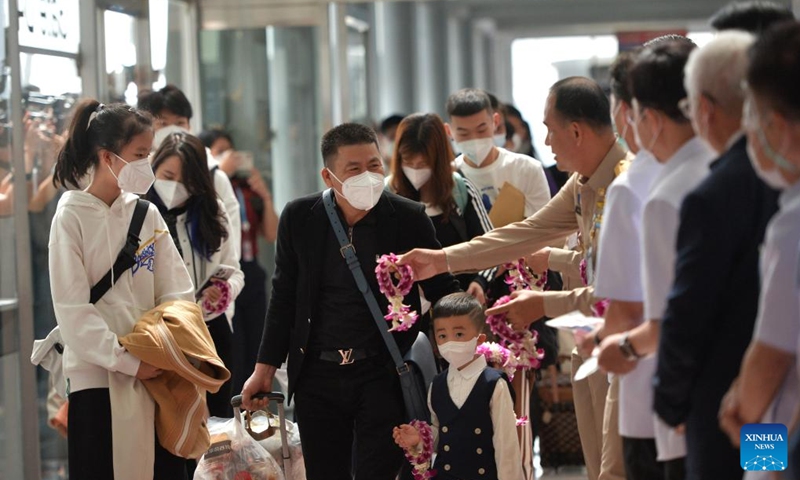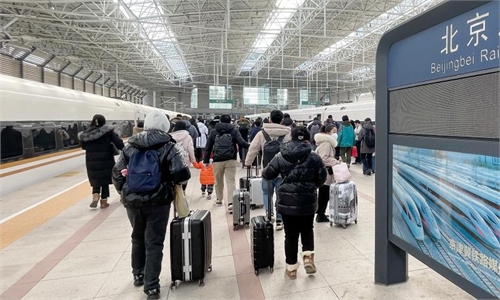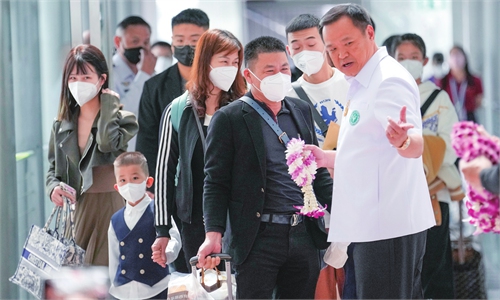
Chinese passengers are welcomed by Thai officials at the Suvarnabhumi Airport in Samut Prakan, Thailand, Jan. 9, 2022. Thailand on Monday welcomed the arrival of thousands of Chinese tourists in its capital of Bangkok, the first group following China's optimization of COVID-19 strategy which took effect on Jan. 8. Photo: Xinhua
Any further extension of quarantine measures against Chinese tourists could lead to a loss of tourism income, the latest statistics for outbound travel by Chinese visitors showed.
Having made 169 million overseas visits in 2019, ranking first in the world, Chinese tourists are indispensable for many destinations, as spending by Chinese visitors accounted for nearly one-fifth of the world's total tourism spending.
After China optimized its anti-COVID policies, with outbound travel resuming, Chinese tourists immediately rushed to travel destinations such as Thailand, Singapore and Indonesia.
According to online travel platform Trip.com, cross-border air ticket orders increased more than four times year-on-year during this year's Spring Festival. Outbound air ticket orders for Bali increased 30 times year-on-year, with orders rising eight times for Singapore, five times for Manila, four times for Bangkok and Phuket, and nearly three times for Chiang Mai and Kuala Lumpur.
According to the Tourism Authority of Thailand, 300,000 Chinese tourists are expected to visit Thailand in the first quarter of 2023, and the total number of Chinese tourists could reach 5 million for the whole year.
The projection is in line with the friendly attitude toward Chinese tourists, a manager surnamed Du at a Beijing-based travel agency told the Global Times on Sunday.
"Thailand was one of the hottest overseas travel destinations during the Spring Festival holiday," said Du.
She noted that Japan used to be a hot destination but the agency only had a few bookings for Japan during the Chinese New Year holiday.
"A lot of people have seen reports on how Chinese tourists were treated in a 'discriminatory' way in Japan and South Korea. People travel to have fun, not to feel humiliated," said Du.
A manager named Suki at a hotel in Shibuya, Tokyo, told the Global Times that they expected Chinese tourists to come but only "got a few bookings, which disappointed them."
"Maybe the high air ticket price is one of the reasons that prevented Chinese guests from coming. Those who are really rich would choose more expensive hotels," said Suki.
Since January 8, the Japanese government has strengthened entry management for Chinese travelers, such as requiring more accurate nucleic acid tests or quantitative antigen tests upon landing at airports, requiring negative nucleic acid tests within 72 hours before boarding, and urging airlines not to increase the number of flights between China and Japan.
Those countries who have set up unwelcoming conditions for Chinese tourists are losing out, industry insiders said.
China said on January 20 that it would resume group tours to 20 countries from February 6, but Japan was not among the destinations.
According to statistics from the Japan National Tourism Organization, Chinese tourists accounted for about 30 percent of foreign visitors to Japan in 2019. Chinese tourists were also big spenders, accounting for about 35 percent of the 4.8 trillion yen ($37 billion) spent by foreign visitors.
Several Chinese citizens in Japan told the Global Times that they are waiting to see if the Japanese government's COVID-19 restrictions will expire after May 8 as it announced on Friday, and how the number of flights between China and Japan will keep up.
On Sunday, the Chinese embassy in Japan announced the resumption of visa issuance for Japanese citizens. A week earlier, the Japanese embassy in China announced that visa service had returned to normal.



